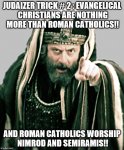Having come from a Judaizer background, I am well familiar with the ploys that they attempt to use to convince others of their worldview.
This thread is going to be a list of such ploys, constructed over time, and separated by a meme that is related to each ploy. Look for the memes, and see if you recognize the approaches taken by Judaizers when watching YouTube videos or reading posts here.
Before I begin, note that what I mean by "Judaizer" are those who claim that observance of the Mosaic Covenant as a whole, or elements of it which are questionable or are clearly taught against in the apostolic writings, are still applicable to New Covenant Christians, and that non-observers are in sin because these elements are requirements, conditions, or necessary fruit of salvation. I have no issue with those who observe physical circumcision, Sabbath, festivals, and clean meat laws out of preference and not obligation. Mutilate your privates all you want, and worship on whatever day you want, and eat whatever meats you want..I don't care As long as you believe that justification is by grace through faith alone, unto good works, and don't accuse non-observers of being disobedient and in sin, I don't care.
As long as you believe that justification is by grace through faith alone, unto good works, and don't accuse non-observers of being disobedient and in sin, I don't care.
How do I know if a person is a Judaizer? Ask them if they think you are in sin for non-observance. Ask yourself if their overall attitude reflects one of judging others for non-observance. Either of those approaches should render an answer. I find that most observers are, at some level, Judaizers. They will generally show their colors at one point or another.
I know Messianic Jews who observe these things who are not Judaizers, though, and generally they are hated and despised by other Judaizers because they don't claim non-observers are required to observe Torah.
The general approach I'll follow is to produce a meme and comment on it, so if you want to see my comments over time, look for the memes. The memes will begin a new section.
The first one is about the claim that if you don't follow Torah you don't love Jesus.
They base this primarily on John 14:15 and similar verses:
John 14:15 “If you love me, you will keep my commandments.".
Real Christians DO obey Jesus and his commandments, but they follow the commandments that have given to THEM, not the ancient nation of Israel.
The Judaizer insinuation is that if you don't keep either the Ten Commandments or the Torah, depending on the group, you don't love Jesus.
I also find it ironic when Seventh Day Adventists attempt to make this claim, because they themselves consider non-life threatening abortions to be acceptable, and therefore are promoting abortion, which is murder. And, there is no question concerning murder being a sin. Internally, amongst their membership, they allow abortion for incidences of rape, incest and congenital birth defects (including Down's Syndrome). Externally, in their health care facilities, they perform abortions for any legal reason, including simply the desire to get rid of the fetus. This is a well documented fact, and some SDAs are against their church's policy on this, but it is the official church policy. Ben Carson stated his opposition to this SDA policy during his brief candidacy for president.
Additionally, the "Torah observers" don't really observe Torah themselves, as it is impossible to do so. God made certain of that by destroying the Temple and the records regarding the Levitical priesthood, which were stored in the Temple. There is no possible way ANYONE can observe Torah now. The best they can do is observe a patchwork quilt of Torah that they have fabricated in their own minds. There is no animal sacrifice system in place either. Torah was not a pick-and-choose system; it required observance of ALL of the commandments of Torah, and the system that Israel operated under is no longer in place. Anyone who claims to observe Torah is simply deceived or is a liar.
See the words of these verses, and the emphasis that Deuteronomy gives in regards to observing "all the law".
Deut 28:58-59 [SUP]58 [/SUP]“If you are not careful to do all the words of this law that are written in this book, that you may fear this glorious and awesome name, the Lord your God, [SUP]59 [/SUP]then the Lord will bring on you and your offspring extraordinary afflictions, afflictions severe and lasting, and sicknesses grievous and lasting.
Deut 29:29 [SUP]29 [/SUP]“The secret things belong to the Lord our God, but the things that are revealed belong to us and to our children forever, that we may do all the words of this law.
Deut 31:12-13 [SUP]12 [/SUP]Assemble the people, men, women, and little ones, and the sojourner within your towns, that they may hear and learn to fear the Lord your God, and be careful to do all the words of this law, [SUP]13 [/SUP]and that their children, who have not known it, may hear and learn to fear the Lord your God, as long as you live in the land that you are going over the Jordan to possess.”
Deut 32:46 [SUP]46 [/SUP]he said to them, “Take to heart all the words by which I am warning you today, that you may command them to your children, that they may be careful to do all the words of this law.
2 Chron 33:8 [SUP]8 [/SUP]and I will no more remove the foot of Israel from the land that I appointed for your fathers, if only they will be careful to do all that I have commanded them, all the law, the statutes, and the rules given through Moses.”When questioned appropriately, almost every "Torah observer" I've talked to admits that they don't keep the whole law, if they are honest. As I've noted, they CAN'T because the Levitical priesthood and the Temple sacrificial system is not in place. Jesus replaced the Levitical priesthood, and the Temple has been destroyed since AD70. Therefore, the Mosaic Covenant or Law cannot be kept. God did this to remove ANY CLAIM that righteousness can be pursued through observance of the Law.
Those who claim to observe the Law likely do not go up to Jerusalem to keep the festivals during the commanded three pilgrimage festivals, unless they are rich or live in Jerusalem. They likely do not build a Sukkot to occupy during the Feast of Tabernacles. I doubt they observe the family purity law of avoiding contact with their wives or other women during the specified period around the menstrual cycle.
There are all kinds of creative work-around excuses that they employ to claim they still observe Torah such as teaching that the family purity law only applied to Levites but this explanation is bogus. They cannot prove that contextually. Their efforts to claim they are Torah compliant are futile and ridiculous.
Why am I bothering to say anything about this? The Judaizer doctrine develops a group of people who are very condemning toward fellow Christians, and is also very prideful and paranoid in nature. If the Judaizer is not prideful, he is likely self-condemning. The prideful ones think they are fulfilling the Law. The self-condemning ones know that they are not, and they are fearful of their salvation. I spent time, as an Armstrongite, in both groups. At different times I was very prideful, thinking I was fulfilling the conditions for my salvation through observing a stripped-down version of the Mosaic Covenant. Toward the end of my Judaizer career, I was very self-condemning. I realized I fell far short of God's righteous standards. I didn't realize what "grace" meant, not did I understand justification by faith alone and how my righteousness was in Jesus Christ and his meritorious obedience applied to my account. So, the Judaizer mindset is very damaging to the individual and to those around him. The Judaizer likely hasn't understood the essence of the gospel; that we have peace with God through Jesus Christ our Savior (Romans 5:1).
Often Judaizers here will claim I'm nursing old wounds and speaking out of bitterness. That is how they attempt to negate my testimony that Judaizing is not a proper perspective. They try to be my armchair psychologist sometimes..it gets pretty hilarious and I laugh about their posts. Another group tries to warn me that I'm close to losing my salvation by speaking against "God's law" and that I need to return back to the fold. The reality is that I'm very happy as an evangelical Christian, and I'm hanging out with people in real life who show the fruit of their faith, unlike the dead, rotten fruit I often saw as a Judaizer in the groups I was involved with.
Those who hold or teach false doctrine also hate being exposed. So, they attempt to discredit those who expose their error. Herbert Armstrong, the leader of the cult I belonged to, claimed that Christians were wolves and he was the real deal. This is another Judaizer trick that I will cover, although it's not specific to Judaizers..cults use the same tactic.
Anyways this is the first Judaizer trick I will cover. I am posting two memes relating to this post. I will post a meme for each point I cover so you can see the break in the conversation.
This thread is going to be a list of such ploys, constructed over time, and separated by a meme that is related to each ploy. Look for the memes, and see if you recognize the approaches taken by Judaizers when watching YouTube videos or reading posts here.
Before I begin, note that what I mean by "Judaizer" are those who claim that observance of the Mosaic Covenant as a whole, or elements of it which are questionable or are clearly taught against in the apostolic writings, are still applicable to New Covenant Christians, and that non-observers are in sin because these elements are requirements, conditions, or necessary fruit of salvation. I have no issue with those who observe physical circumcision, Sabbath, festivals, and clean meat laws out of preference and not obligation. Mutilate your privates all you want, and worship on whatever day you want, and eat whatever meats you want..I don't care
How do I know if a person is a Judaizer? Ask them if they think you are in sin for non-observance. Ask yourself if their overall attitude reflects one of judging others for non-observance. Either of those approaches should render an answer. I find that most observers are, at some level, Judaizers. They will generally show their colors at one point or another.
I know Messianic Jews who observe these things who are not Judaizers, though, and generally they are hated and despised by other Judaizers because they don't claim non-observers are required to observe Torah.
The general approach I'll follow is to produce a meme and comment on it, so if you want to see my comments over time, look for the memes. The memes will begin a new section.
The first one is about the claim that if you don't follow Torah you don't love Jesus.
They base this primarily on John 14:15 and similar verses:
John 14:15 “If you love me, you will keep my commandments.".
Real Christians DO obey Jesus and his commandments, but they follow the commandments that have given to THEM, not the ancient nation of Israel.
The Judaizer insinuation is that if you don't keep either the Ten Commandments or the Torah, depending on the group, you don't love Jesus.
I also find it ironic when Seventh Day Adventists attempt to make this claim, because they themselves consider non-life threatening abortions to be acceptable, and therefore are promoting abortion, which is murder. And, there is no question concerning murder being a sin. Internally, amongst their membership, they allow abortion for incidences of rape, incest and congenital birth defects (including Down's Syndrome). Externally, in their health care facilities, they perform abortions for any legal reason, including simply the desire to get rid of the fetus. This is a well documented fact, and some SDAs are against their church's policy on this, but it is the official church policy. Ben Carson stated his opposition to this SDA policy during his brief candidacy for president.
Additionally, the "Torah observers" don't really observe Torah themselves, as it is impossible to do so. God made certain of that by destroying the Temple and the records regarding the Levitical priesthood, which were stored in the Temple. There is no possible way ANYONE can observe Torah now. The best they can do is observe a patchwork quilt of Torah that they have fabricated in their own minds. There is no animal sacrifice system in place either. Torah was not a pick-and-choose system; it required observance of ALL of the commandments of Torah, and the system that Israel operated under is no longer in place. Anyone who claims to observe Torah is simply deceived or is a liar.
See the words of these verses, and the emphasis that Deuteronomy gives in regards to observing "all the law".
Deut 28:58-59 [SUP]58 [/SUP]“If you are not careful to do all the words of this law that are written in this book, that you may fear this glorious and awesome name, the Lord your God, [SUP]59 [/SUP]then the Lord will bring on you and your offspring extraordinary afflictions, afflictions severe and lasting, and sicknesses grievous and lasting.
Deut 29:29 [SUP]29 [/SUP]“The secret things belong to the Lord our God, but the things that are revealed belong to us and to our children forever, that we may do all the words of this law.
Deut 31:12-13 [SUP]12 [/SUP]Assemble the people, men, women, and little ones, and the sojourner within your towns, that they may hear and learn to fear the Lord your God, and be careful to do all the words of this law, [SUP]13 [/SUP]and that their children, who have not known it, may hear and learn to fear the Lord your God, as long as you live in the land that you are going over the Jordan to possess.”
Deut 32:46 [SUP]46 [/SUP]he said to them, “Take to heart all the words by which I am warning you today, that you may command them to your children, that they may be careful to do all the words of this law.
2 Chron 33:8 [SUP]8 [/SUP]and I will no more remove the foot of Israel from the land that I appointed for your fathers, if only they will be careful to do all that I have commanded them, all the law, the statutes, and the rules given through Moses.”When questioned appropriately, almost every "Torah observer" I've talked to admits that they don't keep the whole law, if they are honest. As I've noted, they CAN'T because the Levitical priesthood and the Temple sacrificial system is not in place. Jesus replaced the Levitical priesthood, and the Temple has been destroyed since AD70. Therefore, the Mosaic Covenant or Law cannot be kept. God did this to remove ANY CLAIM that righteousness can be pursued through observance of the Law.
Those who claim to observe the Law likely do not go up to Jerusalem to keep the festivals during the commanded three pilgrimage festivals, unless they are rich or live in Jerusalem. They likely do not build a Sukkot to occupy during the Feast of Tabernacles. I doubt they observe the family purity law of avoiding contact with their wives or other women during the specified period around the menstrual cycle.
There are all kinds of creative work-around excuses that they employ to claim they still observe Torah such as teaching that the family purity law only applied to Levites but this explanation is bogus. They cannot prove that contextually. Their efforts to claim they are Torah compliant are futile and ridiculous.
Why am I bothering to say anything about this? The Judaizer doctrine develops a group of people who are very condemning toward fellow Christians, and is also very prideful and paranoid in nature. If the Judaizer is not prideful, he is likely self-condemning. The prideful ones think they are fulfilling the Law. The self-condemning ones know that they are not, and they are fearful of their salvation. I spent time, as an Armstrongite, in both groups. At different times I was very prideful, thinking I was fulfilling the conditions for my salvation through observing a stripped-down version of the Mosaic Covenant. Toward the end of my Judaizer career, I was very self-condemning. I realized I fell far short of God's righteous standards. I didn't realize what "grace" meant, not did I understand justification by faith alone and how my righteousness was in Jesus Christ and his meritorious obedience applied to my account. So, the Judaizer mindset is very damaging to the individual and to those around him. The Judaizer likely hasn't understood the essence of the gospel; that we have peace with God through Jesus Christ our Savior (Romans 5:1).
Often Judaizers here will claim I'm nursing old wounds and speaking out of bitterness. That is how they attempt to negate my testimony that Judaizing is not a proper perspective. They try to be my armchair psychologist sometimes..it gets pretty hilarious and I laugh about their posts. Another group tries to warn me that I'm close to losing my salvation by speaking against "God's law" and that I need to return back to the fold. The reality is that I'm very happy as an evangelical Christian, and I'm hanging out with people in real life who show the fruit of their faith, unlike the dead, rotten fruit I often saw as a Judaizer in the groups I was involved with.
Those who hold or teach false doctrine also hate being exposed. So, they attempt to discredit those who expose their error. Herbert Armstrong, the leader of the cult I belonged to, claimed that Christians were wolves and he was the real deal. This is another Judaizer trick that I will cover, although it's not specific to Judaizers..cults use the same tactic.
Anyways this is the first Judaizer trick I will cover. I am posting two memes relating to this post. I will post a meme for each point I cover so you can see the break in the conversation.
Attachments
-
67.7 KB Views: 62
Last edited:





